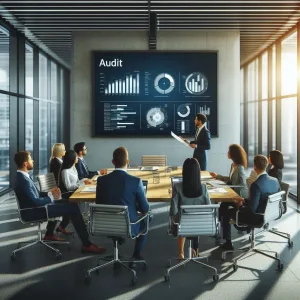The landscape of internal auditing and auditor jobs (remote) has undergone a significant transformation in recent years, particularly with the rise of remote work. As organizations increasingly embrace flexible work arrangements, internal auditors are finding themselves navigating a new virtual environment that challenges traditional practices. This shift has not only altered how audits are conducted but has also necessitated a reevaluation of the skills required to perform effectively in this setting.
- Overview of the Shift to Remote Auditor Job and Work: The transition to remote auditing has been accelerated by global events, pushing auditors to adapt quickly to new technologies and methodologies. This change has proven to be both a challenge and an opportunity, as auditors leverage digital tools to maintain audit quality while working from home or other remote locations [2][9].
- Importance of Adapting Traditional Skills: While the core competencies of internal auditing remain relevant, the virtual environment demands a fresh approach. Auditors must now focus on enhancing their communication skills, utilizing cloud-based audit tools, and fostering relationships with stakeholders in a digital context, as auditors transition towards remote jobs. Adapting these traditional skills is crucial for ensuring that audits are conducted efficiently and effectively, even when teams are not physically present [3][6].
- Audience Engagement: This blog post is tailored for internal auditors and career changers looking to understand how to navigate the evolving landscape of remote auditing. Readers will gain insights into the necessary adaptations of their skill sets, best practices for remote audits, and strategies for maintaining high standards of audit quality in a virtual world. By the end of this discussion, you will be equipped with the knowledge to thrive in the new normal of internal auditing [4].
As we delve deeper into the topic, we will explore how traditional auditing skills can be effectively translated into the virtual realm, ensuring that internal auditors remain indispensable in their roles amidst the ongoing changes in the workplace.
The Changing Landscape of Internal Audit
The internal audit profession is undergoing a significant transformation as remote work becomes increasingly prevalent. This shift not only alters how audits are conducted but also necessitates a reevaluation of the skills and strategies employed by auditors. Here are some key points to consider regarding the evolution of internal audit in response to remote work trends:
Statistics on Auditor Remote Job Adoption in the Industry
- The trend towards remote work has accelerated, with many organizations embracing flexible work arrangements. A recent survey indicated that a substantial number of internal auditors have transitioned to remote roles, reflecting a broader acceptance of this model within the industry [2].
- According to findings from a survey by the Internal Audit Foundation and AuditBoard, remote auditing has become a viable option for many firms, with a notable increase in the adoption of cloud audit tools to facilitate collaboration and communication [3][7].
Challenges and Opportunities Presented by Remote Auditor Jobs
- Remote auditing presents unique challenges, such as ensuring effective communication with stakeholders and managing the availability of key personnel. Auditors must adapt their traditional approaches to account for these factors, which include verifying the availability of auditees and gathering necessary information remotely [4].
- However, this shift also opens up opportunities for greater flexibility and efficiency. Many auditors report improved work-life balance due to the autonomy that remote work provides, allowing them to manage their time more effectively. Additionally, the use of technology in remote audits can enhance data analysis and reporting capabilities, leading to more insightful outcomes.
The internal audit profession is evolving in response to the growing trend of remote work. By embracing new technologies and adapting traditional skills, internal auditors can not only meet the challenges posed by this shift but also capitalize on the opportunities it presents. As the landscape continues to change, staying informed and agile will be crucial for success in this new virtual environment.
Key Auditing Skills for Remote Environments
As the landscape of internal auditing shifts towards remote and hybrid modelsn (in short, remote auditor jobs), auditors must adapt their traditional skills to thrive in this new environment. Here are some essential skills that are crucial for remote auditing success:
- Communication Skills: In a virtual setting, clear and effective communication becomes paramount. Auditors must be adept at using various online platforms to convey information, share findings, and engage with team members. The ability to articulate thoughts succinctly and maintain professional relationships through video calls, emails, and messaging apps is essential for fostering collaboration and ensuring that all stakeholders are aligned throughout the audit process. This shift emphasizes the need for auditors to develop strong virtual communication strategies to overcome the challenges posed by physical distance [1][11].
- Analytical Skills: The ability to analyze data is a cornerstone of auditing, and this skill must be adapted to leverage remote tools effectively. Auditors should be proficient in using data analysis software and techniques that facilitate remote data gathering and evaluation. This includes understanding how to interpret data from various digital sources and ensuring that analytical methods are robust enough to maintain audit quality, even when conducted remotely. The transition to remote auditing requires auditors to be innovative in their approach to data analysis, utilizing technology to enhance their insights and findings [15].
- Technical Skills: With the increasing reliance on technology in remote audits, auditors must be comfortable using various software and tools that support the auditing process. This includes project management software, communication tools, and data analytics platforms. Familiarity with these technologies not only streamlines the audit process but also enhances the auditor’s ability to collaborate with team members and clients effectively. As remote auditing becomes more prevalent, auditors who can leverage technology to its fullest potential will be better positioned to succeed in their roles [10][14].
Adapting to a remote auditor jobs requires internal auditors to enhance their communication, analytical, and technical skills. By focusing on these key areas, auditors can ensure they remain effective and relevant in a rapidly evolving professional landscape.
Leveraging Technology in Remote Auditing
As the landscape of internal auditing shifts towards remote work, it is essential for auditors to adapt their traditional skills to effectively navigate virtual environments. This section explores the tools and technologies that facilitate remote auditing, providing insights into essential software, best practices, and successful case studies.
Overview of Essential Auditing Software and Platforms for Virtual Collaboration
In a remote auditing environment, several software solutions and platforms have emerged as vital for collaboration and efficiency. Key tools include:
- Cloud-Based Audit Management Software: These platforms allow auditors to manage audit workflows, documentation, and communication in real-time. Tools like AuditBoard and TeamMate provide centralized access to audit plans, findings, and reports, enabling seamless collaboration among team members and stakeholders [5].
- Video Conferencing Tools: Applications such as Zoom and Microsoft Teams have become indispensable for conducting virtual meetings with clients and team members. They facilitate discussions, presentations, and interviews, ensuring that auditors can engage effectively with stakeholders despite physical distances [4].
- Document Sharing and Collaboration Tools: Platforms like Google Drive and SharePoint enable auditors to share documents securely and collaborate on audit findings. These tools support version control and real-time editing, which are crucial for maintaining accuracy and transparency in the audit process [3].
Best Practices for Using Technology to Streamline Audit Processes
To maximize the effectiveness of remote auditors in their jobs, auditors should consider the following best practices:
- Invest in Training: Ensuring that all team members are proficient in using the selected tools is critical. Regular training sessions can help auditors become more comfortable with technology, leading to improved efficiency and collaboration [7][8].
- Establish Clear Communication Protocols: Setting guidelines for communication can help mitigate misunderstandings and ensure that all team members are on the same page. This includes defining preferred communication channels and response times [6].
- Utilize Automation: Leveraging automation tools can significantly reduce manual tasks, allowing auditors to focus on higher-value activities. For instance, automated data analytics tools can help identify anomalies and trends, streamlining the audit process [10][12].
As internal auditors adapt to a virtual world, leveraging technology is crucial for maintaining the integrity and effectiveness of the audit process. By embracing essential software, following best practices, and learning from successful case studies, auditors can thrive in remote environments and continue to provide valuable insights to their organizations.
Building Relationships in a Virtual Environment
In the realm of internal auditing, the shift to remote work has necessitated a reevaluation of traditional skills, particularly in the area of relationship-building. As auditors adapt to virtual environments, fostering strong professional connections becomes essential for effective collaboration and successful audit outcomes. Here are some key strategies and insights on maintaining rapport, networking, and building trust in remote auditing.
Strategies for Maintaining Rapport with Team Members and Clients Remotely
- Prioritize Clear Communication: Effective communication is the cornerstone of any successful remote relationship. Regular check-ins and updates can help ensure that everyone is on the same page. Utilize various communication tools to facilitate discussions and provide feedback, which is crucial for maintaining engagement and understanding [2][9].
- Be Intentional About Relationship Building: Remote work can limit spontaneous interactions that often lead to camaraderie. As an auditor, take the initiative to schedule informal virtual coffee chats or team-building activities. These interactions can help bridge the gap and foster a sense of community among team members [3].
- Utilize Virtual Tools Effectively: Leverage technology to create a more interactive experience during meetings. Use video calls to enhance personal connections, and consider collaborative platforms that allow for real-time feedback and brainstorming sessions [4][6].
Tips for Effective Virtual Networking and Professional Connections
- Engage in Online Communities: Join professional networks and forums related to internal auditing. Participating in discussions and sharing insights can help you connect with peers and industry leaders, expanding your professional network [4][15].
- Attend Virtual Conferences and Webinars: These events provide opportunities to learn and network with other professionals in the field. Make an effort to engage with speakers and attendees through chat features or follow-up emails, which can lead to meaningful connections [14].
- Follow Up and Stay Connected: After meeting someone virtually, send a follow-up message to express your appreciation for the conversation. Regularly check in with your contacts to maintain the relationship, which can be beneficial for future collaborations or job opportunities [15].
The Role of Trust in Remote Audit Engagements
Building trust in a remote environment is critical for successful audit engagements. Trust is established through consistent communication, transparency, and reliability. Here are some ways to foster trust:
Be Transparent: Share your audit processes and findings openly with clients and team members. Transparency helps to build credibility and reassures stakeholders that the audit is being conducted with integrity [3][6].
Demonstrate Reliability: Consistently meet deadlines and deliver high-quality work. Reliability reinforces trust and shows that you are committed to the success of the audit and the satisfaction of your clients [7].
Encourage Feedback: Create an environment where team members and clients feel comfortable providing feedback. Actively seeking input not only improves processes but also demonstrates that you value their opinions, further strengthening trust [9][10].
Adapting internal audit skills for a virtual world requires a focused approach to relationship-building. By prioritizing communication, leveraging technology, and fostering trust, internal auditors can successfully navigate the challenges of remote work and maintain strong professional connections.
Continuous Learning and Adaptation
In the evolving landscape of internal auditing, particularly in remote environments, the importance of continuous learning and adaptation cannot be overstated. As traditional auditing practices shift to accommodate virtual work, internal auditors must enhance their skills and knowledge to remain effective and relevant. Here are some key points to consider:
- Staying Updated with Industry Trends: The internal audit profession is experiencing significant changes, especially with the rise of remote work. Auditors must stay informed about the latest industry trends, regulatory changes, and technological advancements. Engaging with professional organizations, attending webinars, and participating in industry conferences can provide valuable insights into best practices and emerging challenges in remote auditing [1].
- Resources for Professional Development: There are numerous resources available for auditors looking to develop their skills in a remote setting. Online courses, certification programs, and specialized training in areas such as data analytics, cybersecurity, and remote audit methodologies can enhance an auditor’s capabilities. Platforms like the Internal Audit Foundation and AuditBoard offer webinars and training sessions focused on the unique challenges of remote auditing, helping professionals to build the necessary competencies [9].
- Embracing a Mindset of Adaptability and Growth: The ability to adapt to changing circumstances is crucial for success in remote auditing. Auditors should cultivate a growth mindset, viewing challenges as opportunities for learning and improvement. This involves being open to new technologies, methodologies, and collaborative tools that facilitate remote work. Regular virtual meetings and team-building activities can help maintain connections and foster a culture of continuous improvement within audit teams [5][13].
As the internal audit profession continues to evolve in response to remote work trends, auditors must prioritize continuous learning and adaptability. By staying informed, utilizing available resources, and embracing a growth mindset, internal auditors can effectively navigate the challenges of a virtual world and enhance their professional development.
Conclusion
As the landscape of internal auditing continues to evolve, the transition to remote work has necessitated a reevaluation of traditional auditing skills. Internal auditors must recognize that many of their foundational competencies can be effectively adapted to a virtual environment. Here are some key takeaways:
- Adaptability of Skills: Core auditing skills such as analytical thinking, attention to detail, and effective communication remain crucial in remote settings. However, auditors must also embrace technology and digital tools that facilitate remote collaboration and data analysis. This shift not only enhances efficiency but also ensures that auditors can maintain high standards of assurance and advisory services despite physical distances [1][2].
- Embracing Technology: The requirement to accept, adopt, and adapt technology is now a fundamental skill for internal auditors. Familiarity with remote auditing methodologies and tools is essential for conducting thorough audits while working from home. This technological proficiency can significantly enhance the effectiveness of audit processes and stakeholder engagement [3][4].
- Building Relationships: Establishing and nurturing relationships with audit stakeholders is more challenging in a remote environment. However, it is vital for auditors to cultivate these connections through intentional communication and collaboration strategies. This approach not only fosters trust but also supports a positive workplace culture, even in a virtual setting [5][6].
As we move forward, it is imperative for both seasoned internal auditors and those considering a career change to embrace the opportunities that remote auditing presents. The flexibility and accessibility of remote work can open new avenues for professional growth and development.
We encourage our readers to share their experiences and insights regarding remote auditing. How have you adapted your skills for a virtual environment? What challenges have you faced, and what strategies have you found effective? Your contributions can help foster a community of learning and support among internal auditors navigating this new landscape.
Find out more about Shaun Stoltz https://www.shaunstoltz.com/about/
This post was written by an AI and reviewed/edited by a human.



